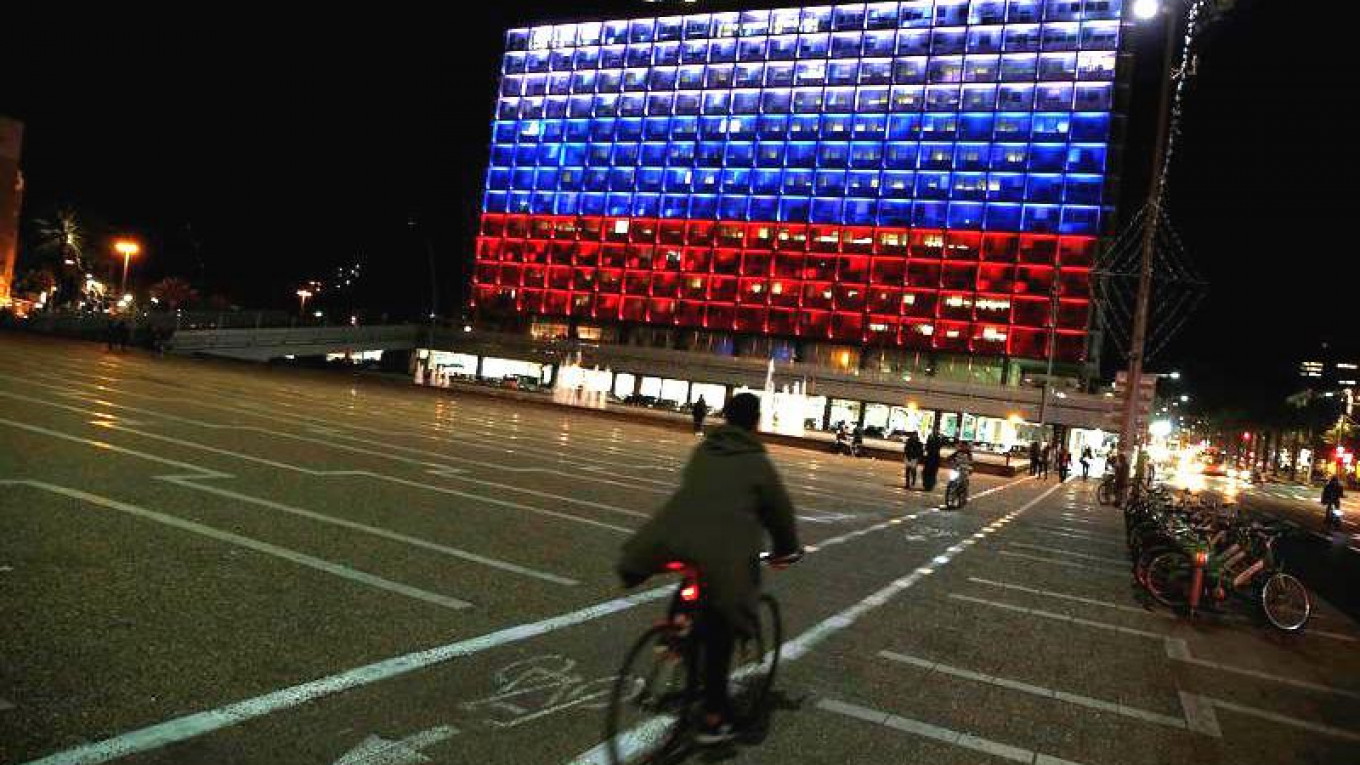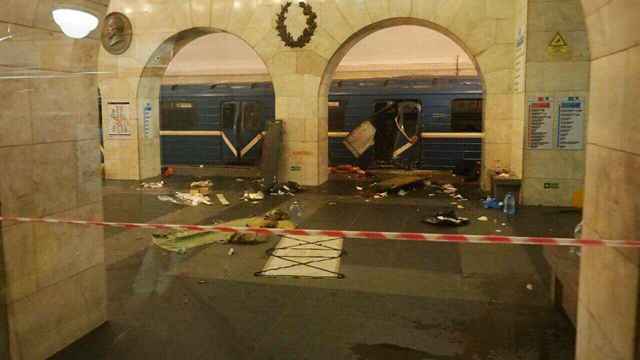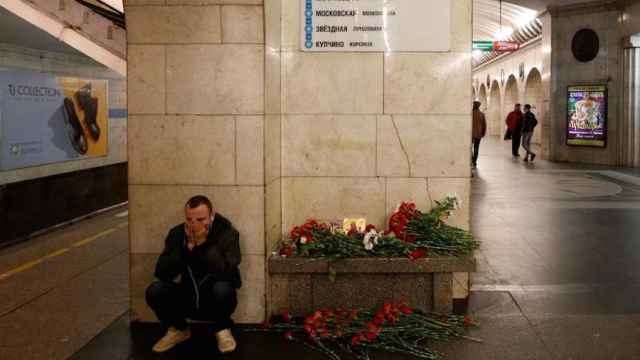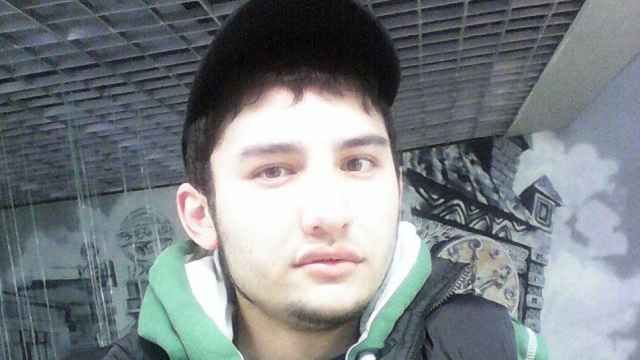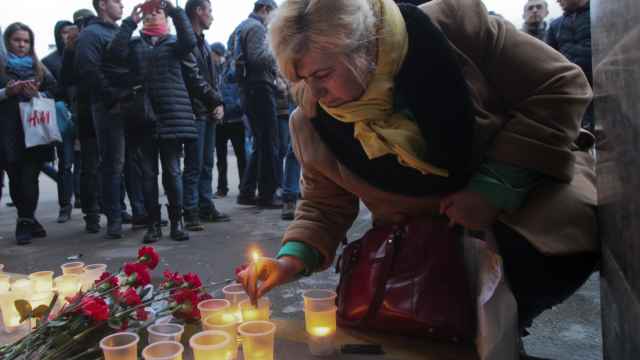Whatever one may think about lighting public buildings in the colors of foreign flags to show solidarity after tragedies, it has nonetheless become a custom, and the absence of Russia’s red, white, and blue following Monday's terrorist bombing did not go unnoticed. In the process, one more opportunity to counter a dangerous narrative was lost.
Of course, we are in the midst of a renewed Cold War and there are all kinds of reasons for Europe to feel hostile toward Russia, from its annexation of Crimea, to its aggressive intelligence activity. Nonetheless, there is a higher calling of human sympathy, a sense that we are all united in the face of the unexpected and undiscriminating threat of terrorism. It is unlikely that any of the passengers on the St. Petersburg metro unleashed the "little green men" in Crimea, or masterminded active measures in Europe's capitals. One can mourn victims without whitewashing governments.
For those who are less convinced, here is the ruthlessly pragmatic rationale.
Everything is symbolic, and by not showing solidarity, Europe played into the hands of a Kremlin narrative that has been deployed again and again on far flimsier grounds. The Kremlin argues that the West is fundamentally Russophobic, and it delights in seeing woes of every kind besetting Russia. That the West seeks to spread confusion, dismay, suspicion and uncertainty. (Sound familiar? Yes, this is exactly what Moscow is doing in Europe).
The corollary is that every time the European Court of Human Rights censures Moscow, every time an EU delegation calls for greater transparency, every time a Western observer notes flaws in electoral processes, it can neatly be discounted as European mischief-making at best, and at worst 'hybrid war.'
It's a depressing piece of rhetorical judo that allows (generally) well-meant observations to be turned into grounds to man the ramparts and repel ideological invaders. Sadly, it works.
So here is an alternative, or rather supplementary, strategy for Europe. Yes, continue to hold the line against Russian abuses and aggressions. Yes, spend that NATO-baseline 2% of GDP on defense. Yes, build up European counter-intelligence and financial security capabilities. Yes, address the challenge of disinformation and political subversion.
But that should not be enough. At the same time, whenever - in the truest sense of the phrase - humanly possible, Europe should try and show Russia as much love as it can. Tough love, maybe, but love nonetheless. Mourn their losses, celebrate their cultural triumphs. Praise the Russians when they do something right (because sometimes they do, you know). Ban their dirty-money oligarchs and their paranoid-patriot lawmakers, but welcome their students, tourists, artists and entrepreneurs.
First of all, this denies the Kremlin's propagandists easy opportunities. Indeed, it actively undermines their pernicious narrative that seeks to force Russians into an artificial choice between us and them, patriot or traitor.
Secondly, remember those dark ideologists who see 'hybrid war' - or perhaps more correctly 'political war' - behind everything? In a way, they are right. This is a struggle of memes and values, of slogans and symbols. Those who see Europe's long-term security in regime change in the Kremlin ought to welcome the opportunity to bring into question the incumbent's assertions that Russians are alone and embattled.
Surrendering to the small-minded individuals who somehow think St. Petersburg does not "deserve" sympathy because of Sevastopol, who assume that every terrible incident is some kind of "false flag" operation instigated by Putin to generate some kind of "rally-round-the-flag" sentiment, is not only wrong, it’s dangerous. It is they who are, ironically enough, his best allies.
Feed
the Kremlin love, feed the Kremlin so much love it chokes. Do it either
because it is right or do it because it is smart, but do it either way.
Mark Galeotti is a senior researcher at the Institute of International Relations Prague and heads its Centre for European Security.
A Message from The Moscow Times:
Dear readers,
We are facing unprecedented challenges. Russia's Prosecutor General's Office has designated The Moscow Times as an "undesirable" organization, criminalizing our work and putting our staff at risk of prosecution. This follows our earlier unjust labeling as a "foreign agent."
These actions are direct attempts to silence independent journalism in Russia. The authorities claim our work "discredits the decisions of the Russian leadership." We see things differently: we strive to provide accurate, unbiased reporting on Russia.
We, the journalists of The Moscow Times, refuse to be silenced. But to continue our work, we need your help.
Your support, no matter how small, makes a world of difference. If you can, please support us monthly starting from just $2. It's quick to set up, and every contribution makes a significant impact.
By supporting The Moscow Times, you're defending open, independent journalism in the face of repression. Thank you for standing with us.
Remind me later.



